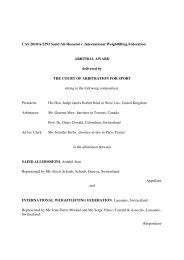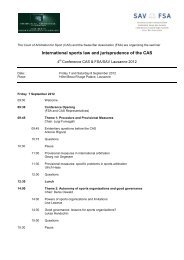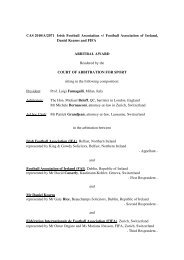(CAS) Bulletin - Tribunal Arbitral du Sport / TAS
(CAS) Bulletin - Tribunal Arbitral du Sport / TAS
(CAS) Bulletin - Tribunal Arbitral du Sport / TAS
You also want an ePaper? Increase the reach of your titles
YUMPU automatically turns print PDFs into web optimized ePapers that Google loves.
ingested by him was contaminated with clenbuterol,<br />
it fi nds that, in light of all the evidence on record, the<br />
Athlete’s positive test for clenbuterol is more likely to<br />
have been caused by the ingestion of a contaminated<br />
food supplement than by a blood transfusion or the<br />
ingestion of contaminated meat. This does not mean<br />
that the Panel is convinced beyond reasonable doubt<br />
that this scenario of ingestion of a contaminated<br />
food supplement actually happened. This is not<br />
required by the UCI ADR or by the WADC, which<br />
refer the Panel only to the balance of probabilities<br />
as the applicable standard of the burden of proof. In<br />
weighing the evidence on the balance of probabilities<br />
and coming to a decision on such basis, the Panel<br />
has to take into consideration and weigh all of the<br />
evidence admitted on re cord, irrespective of which<br />
party advanced which scenario(s) and what party<br />
ad<strong>du</strong>ced which parts of the evidence.<br />
That said, the Panel fi nds it important to clarify that,<br />
by considering and weighing the evidence in the<br />
foregoing manner and deciding on such basis, the<br />
Panel in no manner shifted the burden of proof away<br />
from the Athlete as explained above. The burden of<br />
proof only allocates the risk if a fact or a scenario<br />
cannot be established on a balance of probabilities.<br />
However, this is not the case here.<br />
Consequently, the Athlete is found to have committed<br />
an anti-doping violation as defi ned by Article 21<br />
UCI ADR, and it remains to be examined what the<br />
applicable sanction is.<br />
D. The Sanctions<br />
It is undisputed that it is the fi rst time the Athlete is<br />
found guilty of an anti-doping rule violation.<br />
As already mentioned, Article 293 UCI ADR reads<br />
as follows:<br />
“ The period of Ineligibility imposed for a fi rst anti-doping<br />
rule violation under article 21.1 (Presence of a Prohibited<br />
Substance or its Metabolites or Markers), article 21.2<br />
(Use or Attempted Use of a Prohibited Substance or<br />
Prohibited Method) or article 21.6 (Possession of a<br />
Prohibited Substance or Prohibited Method) shall be<br />
2 (two) years’ Ineligibility<br />
unless the conditions for eliminating or re<strong>du</strong>cing the period of<br />
Ineligibility as provided in articles 295 to 304 or the conditions<br />
for increasing the period of Ineligibility as provided in article<br />
305 are met ”.<br />
Pursuant to this provision, the period of ineligibility<br />
shall be two years. Accordingly, there is no discretion<br />
for the hearing body to re<strong>du</strong>ce the period of<br />
ineligibility <strong>du</strong>e to reasons of proportionality.<br />
As none of the conditions for eliminating or re<strong>du</strong>cing<br />
the period of ineligibility as provided in Articles 295<br />
to 304 UCI ADR are applicable - in particular because<br />
the exact contaminated supplement is unknown and<br />
the circumstances surrounding its ingestion are<br />
equally unknown - the period of ineligibility shall be<br />
two years.<br />
E. The Starting date of the Period of<br />
Ineligibility<br />
Article 314 UCI ADR determines that “Except as<br />
provided under articles 315 to 319, the period of Ineligibility<br />
shall start on the date of the hearing decision providing for<br />
Ineligibility or, if the hearing is waived, on the date Ineligibility<br />
is accepted or otherwise imposed”.<br />
Furthermore, Article 315 UCI ADR determines that<br />
“Where there have been substantial delays in the hearing<br />
process or other aspects of Doping Control not attributable to<br />
the License-Holder, the hearing body imposing the sanction may<br />
start the period of Ineligibility at an earlier date commencing<br />
as early as the date of Sample collection or the date on which<br />
another anti-doping rule violation occurred”.<br />
The Panel is of the opinion that such provision is<br />
applicable in the present matter.<br />
In that relation, the Panel notes that the Appellants<br />
did not respond to the request of the CNCDD of<br />
the RFEC to fi le an additional submission in order<br />
to rebut the reports presented by the Athlete in the<br />
fi rst instance. Because the Appellants refrained from<br />
explaining their positions in more detail despite such<br />
request, the CNCDD of the RFEC was unable to<br />
make a decision with the benefi t of the entire picture<br />
of the Appellants’ allegations and evidence that was<br />
subsequently presented to this Panel; whereas it is<br />
possible that with a fuller picture the CNCDD of<br />
the RFEC might have decided the case more rapidly<br />
and differently, which in turn might have affected the<br />
occurrence of an appeal to the <strong>CAS</strong>.<br />
Furthermore, the proceedings before <strong>CAS</strong> lasted for<br />
over nine months and the hearing was postponed<br />
twice, while delays cannot be specifi cally attributed<br />
to the Athlete or to <strong>CAS</strong> and the Panel agrees<br />
with the Athlete’s submission that his requests for<br />
extension <strong>du</strong>ring the present proceeding were a<br />
direct consequence of having to address and answer<br />
the Appellants’ complex submissions on the blood<br />
transfusion theory as to the source of the prohibited<br />
substance which was not developed in front of the<br />
fi rst instance.<br />
Jurisprudence majeure / Leading cases<br />
-<br />
140





